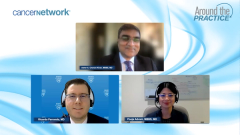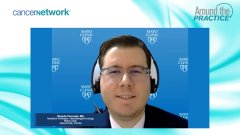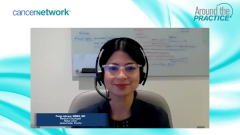
Clinical Case Scenario: Managing a Diagnosis of Atrial Fibrillation
Experts discuss the management of a patient with chronic lymphocytic leukemia who experienced adverse effects such as joint pain and atrial fibrillation while on treatment with ibrutinib, emphasizing the role of cardio-oncology and considering a switch to a second-generation BTK inhibitor for better safety and fewer drug interactions.
Episodes in this series

Asher A. Chanan-Khan, MD, MBBS: This patient story evolved a bit. This patient was enrolled in the clinical trial and was [randomly assigned] to receive ibrutinib as a single agent during that time. After 8 months of therapy, the clinical assessment demonstrated partial remission. With most patients given single-agent ibrutinib, seeing partial remission is not uncommon. But it is what we did, and although [they were] clinically responding, this patient reported increasing pain in their large joints, [such as] hips and shoulders and so forth. That was a concern and a known adverse effect of BTKi [Bruton tyrosine kinase inhibitor]. In addition, although previously noted, to be in the sinus rhythm was now noted to be an irregular heartbeat. And that was part of their work-up: confirmed atrial fibrillation [Afib]. So, what should you do next in the management of this? And the key word would be manage. This has happened: Somebody walked into my clinic, [and] we took a pulse. It was irregular, and we got an ECG [electrocardiogram]. Afib happened [in] this patient. What do I do? [Do I] stop ibrutinib immediately? Is that what I should do? Or [should I] continue ibrutinib but update cardio-oncology? And cardiac oncology is not always available in the community. I would love, Pooja [Advani], your comment on the consultation stuff like that. [For] appropriate anticoagulation [of] patients, we are very capable of doing that. We have done that in our clinic and stretched ibrutinib to second-generation BTK. That will be a third choice, or [you] stop ibrutinib and consider cardioversion. Dr Parrondo, [let’s] hear your short answer as to what we should do and then hear from Pooja’s perspective and what an expert looking at the toxicity perspective thinks should be done.
Ricardo Parrondo, MD: This patient is experiencing some of the typical adverse effects of ibrutinib, Afib, and arthralgia. I find the arthralgia to be quite difficult to manage and quite bothersome for patients. So in this case, there are several right answers, but you want to be careful with suddenly stopping ibrutinib because they can get disease flare. But I would get him to see a cardiologist to institute either cardioversion or start anticoagulation and then switch the patient to a second-generation BTKi that has less arthralgia. And it’s safer, in my opinion, to anticoagulation with a second-generation BTK inhibitor because there are fewer drug-drug interactions compared with ibrutinib.
Asher A. Chanan-Khan, MD, MBBS:Thank you, and Pooja, for your comment, I’m thinking that over 80% of the patients are treated in the community, and cardio-oncology is a newer field. First, would you comment on cardio-oncology? Is it mandatory? Is it something highly recommended in the community, or can we get an oncologist to lean on the inherent cardiology network that they have? Or is there something special we are thinking about?
Pooja Advani, MD, MBBS: Cardio-oncology is a burgeoning field. This is a cardiologist who is intimately familiar with and has expertise in managing the cardiac adverse effects of cancer therapeutics. In an ideal world, any patient with CLL [chronic lymphocytic leukemia]with existing cardiovascular risk factors would benefit from a cardio-oncology consultation in the spirit of being proactive. But as you appropriately pointed out, Dr Chanan-Khan, in the community, access to cardio-oncologists is challenging. One can argue [that] even in academic centers, there’s limited availability of cardio-oncologists. Cardiologists can partner with the patient’s primary hematologist in taking care of these conditions. I would think about referring somebody to a cardiologist or…a cardio-oncologist proactively if there are any red flags in the initial work-up, [such as] seeing or incidentally finding Afib on a baseline ECG. But patients who have a risk of or history of substantial cardiovascular disease [such as] a prior myocardial infarction [MI], for example, well-controlled or recurrent episodes since then, any history of Afib, congestive heart failure, [or] difficult-to-control hypertension, which is defined as taking more than 2 medications to control hypertension, would benefit from a cardiologist or a cardio-oncologist consultation. So what it highlights is a multidisciplinary team approach. Taking care of patients [with] cancer is becoming more and more like a team sport. So having good collaborations with a patient’s cardiologist or cardio-oncologist is extremely important in this scenario. In the case that we were discussing, I completely agree with Dr Parrondo’s approach and would consider changing this patient to a BTKi of the second generation, particularly as you’ve documented a response to ibrutinib in the form of partial remission. It’s also important to risk stratify this patient [as having] high- or low-risk [disease]. Based on available calculators [such as] the CHA2DS2-VASc score, if it’s low, 0 or 1, I’ll be even more confident in continuing a second-generation BTKi for this patient. Challenges with anticoagulation are appropriately pointed out with the increase in bleeding risk. And I would advise caution with using agents such as warfarin in these patients. Considering a second-generation inhibitor obviously has a decreased risk of bleeding. But one can consider proactively the direct oral anticoagulants or even Lovenox [as] long as a patient’s platelet count is over 50,000. Some inherent challenges could come with using these agents, but with appropriate knowledge dissemination to oncologists as well as cardiologists, we can partner together in taking care of these patients.
Asher A. Chanan-Khan, MD, MBBS: Pooja, that was a very nice way to summarize this. From a practical point of community oncologists and other colleagues, is it fair to say that when in the frontline setting, if there are no red flags in terms of recent MI or uncontrolled hypertension and something like that, is it fair for our staff or oncologists to say, “Hey, your disease needs a BTKi. I don’t need to worry about it; you can start it without a cardiology consultation”? I would imagine if somebody had a cardiac event recently or bad disease to begin with, they are already following a cardiologist and so forth. But in a practical setting, in such a scenario where there are no predisposing glaring factors, 90% of patients would do fine [with] that second-generation [BTKi]?
Pooja Advani, MD, MBBS: That’s right. Given the low incidence and lack of previous cardiovascular…
Asher A. Chanan-Khan, MD, MBBS: It’s not mandatory. So the message shouldn’t be BTKi is becoming complicated [so] go for cardiology before you get treated, correct? But once an event has happened, [such as] Afib, you can decrease the incidence further by choosing a second-generation BTKi. And if somebody does develop one, cardioversion is the way to go. And if you do [have cardioversion], then that’s a lucky place to be because you’re trying to avoid anticoagulation support, as you mentioned, and [you can] consider going on to a second-generation inhibitor. In patients who were already on the second-generation [inhibitor], a very small fragment, we talk about 4% to 6%, if they are the ones who developed, Pooja, would you restart the second-generation [inhibitor] again if they were [given cardioversion] appropriately? What if they didn’t [have cardioversion] and they continue having Afib? Should that be stopped or is Afib a contraindication for BTK therapy?
Pooja Advani, MD, MBBS: The short answer is no. BTKi therapy can be continued, particularly as we’re talking about second generation if patients are adequately controlled. One can make an argument that in close collaboration with a cardiologist, you can still consider continuing a second-generation BTK inhibitor, especially if the patient is deriving benefit, even if they have persistent Afib. However, when we think about other things [such as] ventricular arrhythmias, severe uncontrolled hypertension, or unfortunately the Afib [resulting] in severe congestive heart failure where the ejection fraction is less than 30%, then I would be a little cautious in recommending continued use of BTK46 inhibitor therapy. But [with] adequately controlled Afib, one can still consider a second-generation BTKi.
Asher A. Chanan-Khan, MD, MBBS: I love the way our discussion is going because [although] we are talking about therapy for CLL, we are also incorporating toxicity. After all, that is what practical clinicians are thinking. We don’t have separate pockets of mind [that say], “OK, now we’re going to think about that.” Hopefully our audience would appreciate that. The reason we’re going back and forth between response and toxicity is because that’s exactly what’s happening in the clinic: making decisions on treatment selection for response while making sure we keep an eye on toxicity.
Newsletter
Stay up to date on recent advances in the multidisciplinary approach to cancer.










































